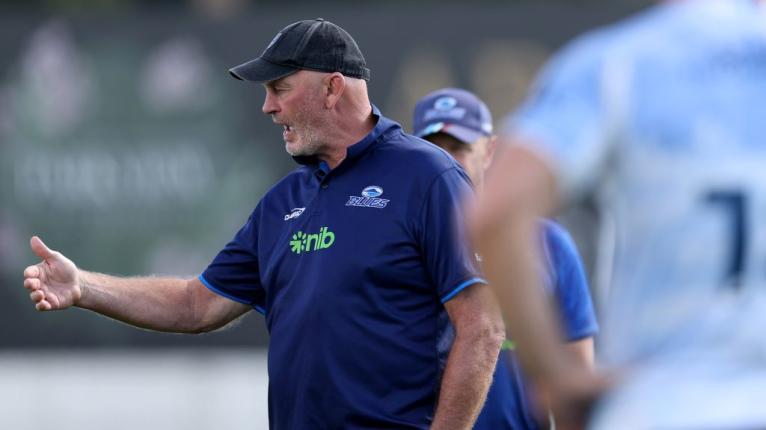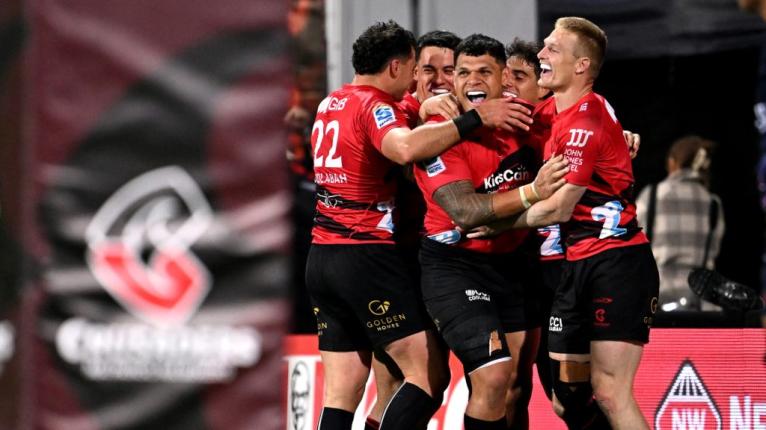And just like that, the power balance within New Zealand rugby seemingly shifted from Christchurch to the North Island. For seven years the Crusaders were untouchable, the smartest and best run club in the country and then, overnight, they collapsed and were usurped by the Hurricanes and Blues.
That those two likely finalists have established themselves as the leading contenders in Super Rugby Pacific is not necessarily a huge surprise. Neither suffered much of a player drain and the talent within both squads has been apparent for some time.
New Hurricanes coach Clark Laidlaw had enjoyed a lengthy and successful tenure with the All Blacks Sevens team and the Blues’ new supremo Vern Cotter arrived at the back end of a long career in which he has won the Top 14 with Clermont and taken Scotland to a World Cup quarter-final. Each has made a strong and positive impression in their first campaigns.

Just as interestingly, the big improvement both sides have made is in their forward play and set-piece work and there is genuine grunt about everything they do. The Hurricanes have never been renowned as a team to grind it out in the trenches and yet this year, that has been their modus operandi – they have scrummed for penalties, attacked tight to the ruck and patiently earned the right to play wider.
It has been eerily similar at the Blues, where Hoskins Sotutu has been transformed into a bruising all-court No 8 with the rest of the pack not far behind in their desire to pick and drive and keep smashing away until teams break. The way both sides are playing, it’s easy to see them being just as effective in late May and early June when the weather turns wintry, and the competition tightens up.
This is particularly relevant in the case of the Blues, who looked like champions in 2022 when they cruised to the final with just one defeat – only to have their lineout destroyed by the Crusaders in the final. Then last year, the Blues were beaten up all over the park by the same opposition in the semi-final, falling to a 52-15 defeat in which their lack of physicality was stunning.
In many ways, those two humbling defeats have inspired the Blues this year, with Cotter building a plan to make sure such humiliation is not inflicted upon them again. Shipping over 50 points to the Crusaders this year would be more than embarrassing, since the defending champions have fallen off a cliff, managing to win just one of their first eight games. Their demise has become as much the story of Super Rugby as the rise of their New Zealand rivals.
The Crusaders have been poor all season, but in those two games in Australia they descended into a rabble – no shape, no idea what they were trying to do and no cohesive plan.
For much of the early part of the season media explained the Crusaders’ regression as an inevitable consequence of the post-World Cup player exodus, in which Sam Whitelock, Richie Mo’unga, Jack Goodhue and Leicester Fainga’anuku all left. Then there was a horrible run of injuries which ruled Scott Barrett, Will Jordan, Braydon Ennor, Tamaiti Williams, Fergus Burke and David Havilli out for long stretches.
But watching the Crusaders lose first to the Waratahs – when they led with two seconds remaining and just had to catch a kick-off and boot the ball out – and then get belted by the Force, it became impossible not to wonder whether there is a deeper problem.
The Crusaders have been poor all season, but in those two games in Australia they descended into a rabble – no shape, no idea what they were trying to do and no cohesive plan. There were multiple execution errors – dropped balls, poor passes and wild kicks – for which the players must take the blame, but the lack of strategic understanding looked more like a coaching problem, and it has to be asked whether the Crusaders got the right coach.
Having lost Scott Robertson to the All Blacks, they seemed to know almost immediately they were going to hire Rob Penney for the 2024 season. Penney is a former Canterbury player and coach, who also worked as an assistant with the Crusaders in 2005, and that may have been his chief qualification as the most successful club in Super Rugby history has never looked outside its own family for a coach.

But Penney’s record in the last decade has not been overwhelming. He had a moderately successful two-year stint at Munster, but ultimately left because he met too much resistance in his efforts to change the way the team played, a similar spell at the Shining Arcs in Japan, before joining the Waratahs where he was sacked 18 months into a three-year contract.
Under his supervision the Tahs won five of 19 games and fell to a few record defeats in the process. Penney’s resume had red flags but the hierarchy ignored them, seemingly seeking a coach with a Crusaders connection at any price. It may be the first major misstep they have made in almost 30 years.
From commentators, I think it’s childish, frankly. When you see those things happen overseas, you don’t see improvements in results, that’s the fact.
The Crusaders, having gone eight years without conceding a try from a rolling maul, had three scored against them in two weeks. The power that defined them was lost in the first half of their campaign. The speed at which they used to transition from defence to attack was no longer there, and the certainty about where they were going to attack and how, was replaced with vague ideas of shuffling sideways or kicking aimlessly. The club lost its way and it will be fascinating to see if they can find a path back, especially as more of their frontline players are going to be returning from injury in the next few weeks.
Barrett and Havilli recovered for Friday’s vsit of the Rebels, and the Crusaders won 39-0. But was this a sign of a revival, or simply a romp against weak opposition in the sort of cold, wet conditions Australian teams have never liked encountering in New Zealand? Will the wins keep coming and structure return, or will critics be proven right with their arguments the club need coaching change to succeed?
Unsurprisingly, perhaps, chief executive Colin Mainsbridge made it clear in an interview on Newstalk ZB he’s sticking by Penney. He also, more intriguingly, had a dig at the media for daring to suggest Penney’s performance should be under intense scrutiny.
“I don’t mind it from fans, because they are emotionally invested in it,” he said.
“Naturally, you’re looking for performance, sometimes that means you can’t think logically or use evidence to arrive at any sort of clarity of decision.

“But from commentators, I think it’s childish, frankly. When you see those things happen overseas, you don’t see improvements in results, that’s the fact.
“There’ll be an exception that proves the rule, but generally it makes no difference, and in fact probably, things get worse.
“There’s a real opportunity to be thoughtful and logical, and just make sure to get the best out of the group and give them all the support you can.
“Unless there’s toxicity or a complete breakdown in trust between players and coaching staff, and that’s not the case.”
In another six weeks it will become apparent whether the Crusaders were right to back their man.



Comments
Join free and tell us what you really think!
Sign up for free